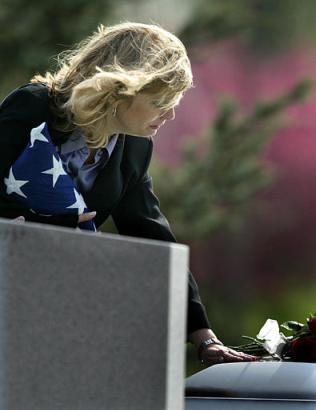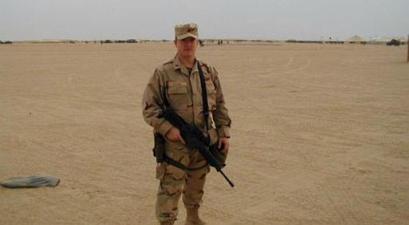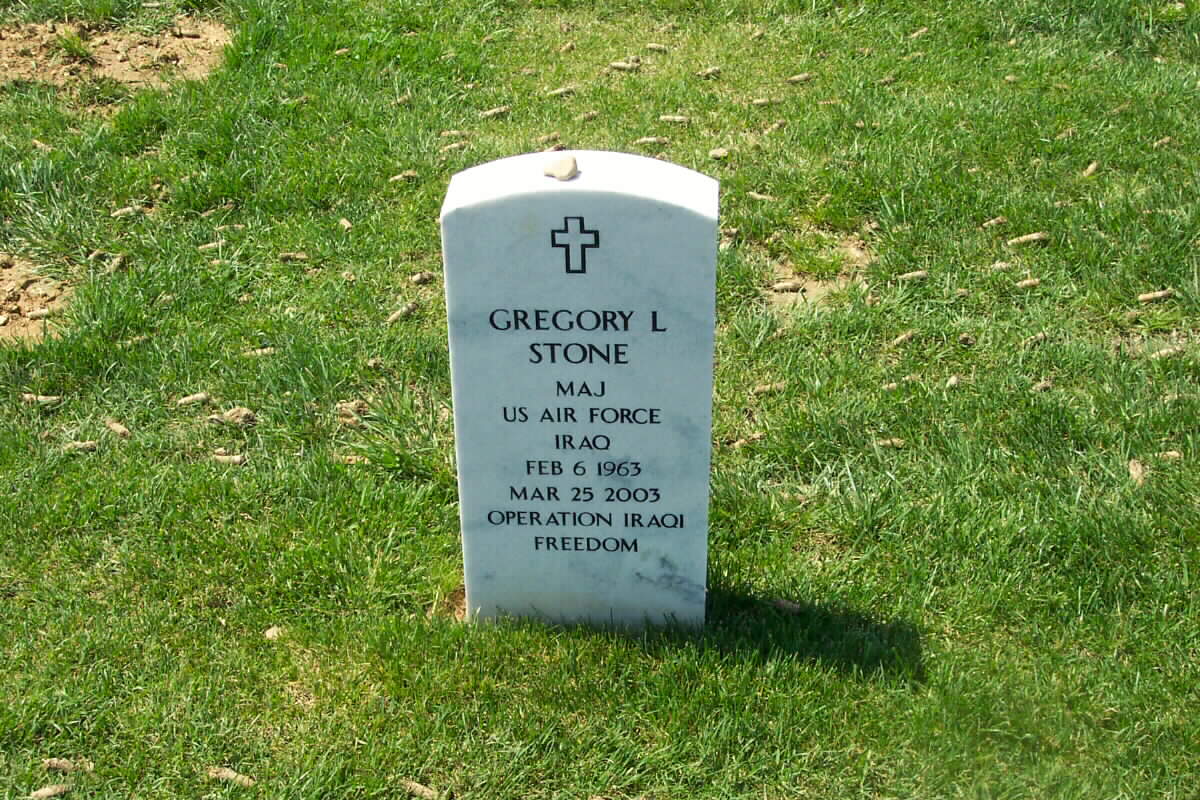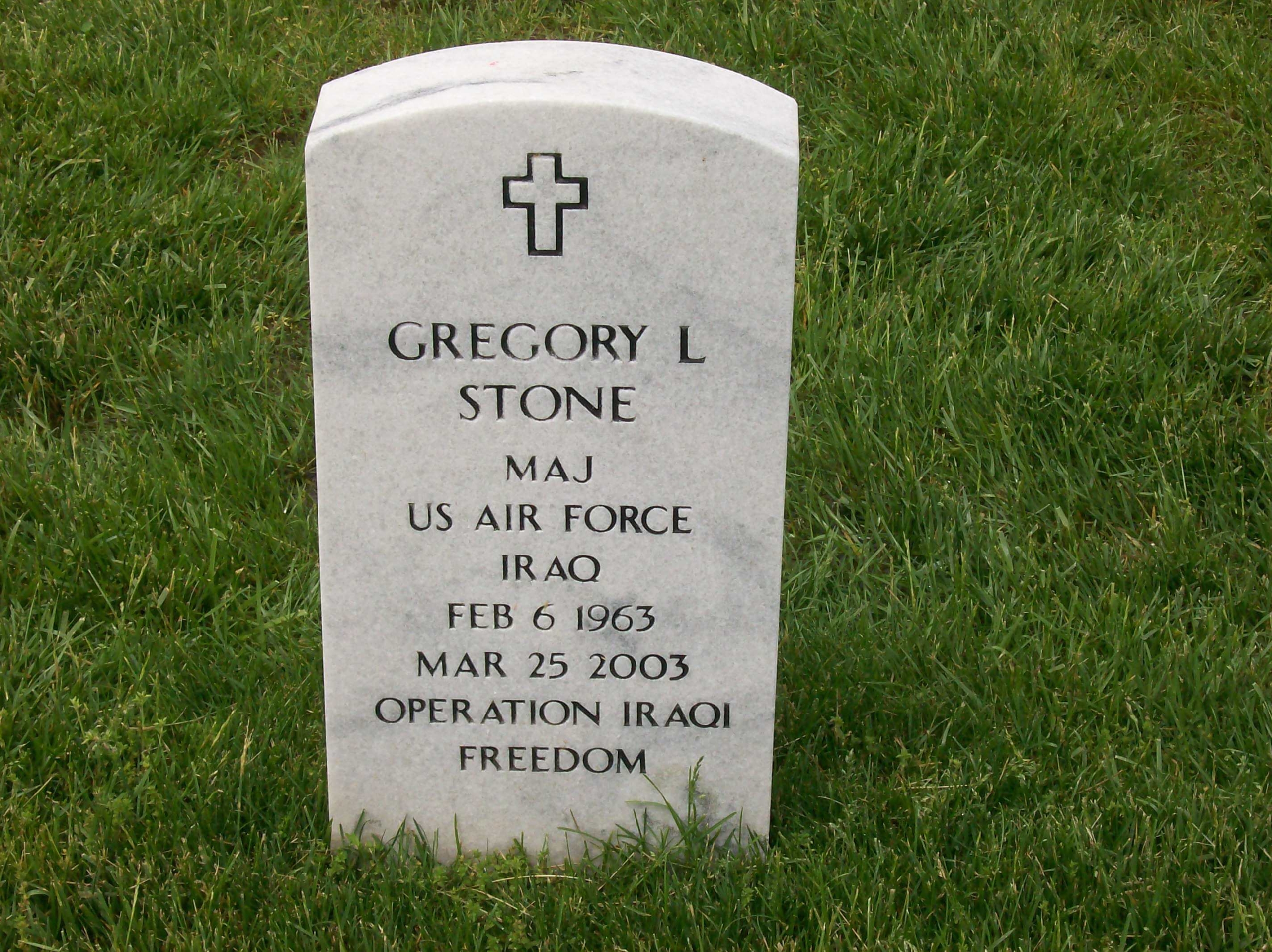April 29, 2005: A military jury has sentenced U.S. Army Sergeant Hasan Akbar to death for killing two officers in a grenade and rifle assault in Kuwaiit.
Akbar, a former 101st Airborne Division soldier, was found guilty a week ago on two counts of pre-meditated murder and three counts of attempted pre-meditated murder after a military court martial at Fort Bragg, North Carolina.
The trial verdict and sentence is subject to “high ranking officer” who could approve the sentence as is or reduce it, officials said in the statement.
Because of the severity of the charges the case will automatically be appealted to a higher U.S. Military Judicial Court.
Akbar of murdering Captain Christopher Seifert and Major Gregory Stone and wounding 14 other soldiers when he rolled two grenades into soldiers' tents and began firing his assault rifle at those who tried to flee the tents.
Akbar’s mother and military attorneys alledge that Akbar snapped in the weight of relentless ridicule and harassment of his Muslim faith by fellow soldiers, according to the published report.
July 12, 2004
Family of Major Stone Upset Over Michael Moore’s MovieThe family of Idaho Air Guard, Major Gregory Stone said they’re being exploited by filmaker Michael Moore.
Major Stone’s family said a video clip from the funeral service last year at Arlington National Cemetery was included in Moore’s controversial movie Farenheit 9-11.
The Boise man who was on active duty with the Air Force was killed in a grenade attack in Kuwait at the beginning of the Iraq War. Stone’s aunt said the family was stunned to see scenes from the funeral service in the film. “There was no permission for it. Greg’s dead, he can’t defend himself or say what he really thinks. There’s no way he would ever let himself be affiliated with Michael Moore,” said Katie Gallagher, Stone’s aunt.
Major Stone was attached to the 101st Airborne when the attack happened. A disgruntled US soldier is charged with throwing the grenades that killed Stone and another officer.
‘Fahrenheit 9/11’ controversy moves beyond politics for local family
Friday, July 9, 2004The controversy over Michael Moore’s film Fahrenheit 9/11 extends beyond politics for one local family.
The family of Boise, Idaho, resident Major Gregory Stone alleges that Moore used footage of Stone’s funeral at Arlington National Cemetery without permission.
The family has not been able to contact Moore’s production company. Moore has said in previous interviews that he used freelance photographers as well as news archives for footage.
While watching the movie, the family was shocked to see film clips of the burial.
“When he died, that was all Michael Moore gets from Greg,” said Stone’s aunt, Kandi Gallagher. “He doesn’t get to throw Greg into his movie and profit off it.”
Stone died after a grenade attack, which was blamed on a U.S. soldier.
Most of Stone’s family lives in the Portland area. He was survived by his former wife and two sons.
18 April 2003:
Twin Burials Salute a Singular Cause
At Arlington, Mourners Honor Iraq War Veterans Who Answered the Call to Duty
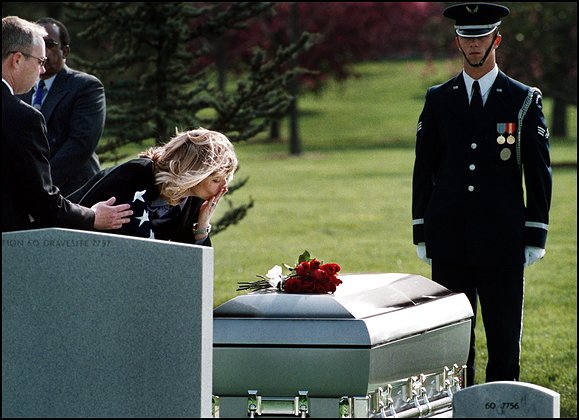
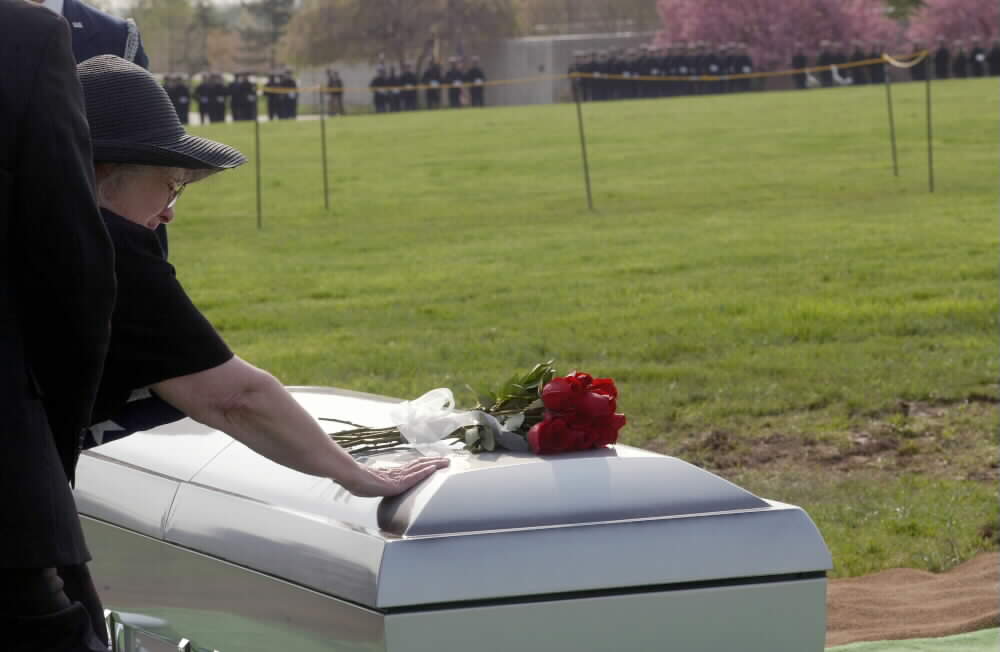
They died differently, one killed in a fierce firefight in Iraq, the other in a grenade attack by a fellow airman in Kuwait, but Marine Lance Corporal Patrick Nixon and Air National Guard Major Gregory Stone were buried side by side yesterday in the soil of Arlington National Cemetery.
On a breezy, sun-drenched morning, Stone’s flag-draped casket, borne on a horse-drawn caisson with a riderless horse leading the way, was the first to arrive at the waiting graves. As a band played “America the Beautiful” in the distance, more than 200 relatives, friends and military personnel gathered to honor the memory of the 40-year-old Idaho man.
The chaplain, Air Force Captain Mark Thomas, said Stone “leaves a legacy worth modeling: husband, loving father, an obedient son and a proud American.” Calling Arlington a fitting place for Stone, Thomas said he would “rest here with those of like mind and determination, the determination to see this nation remain a beacon of light to a world searching true liberty.”
Brigadier General Gary L. Sayler, commander of the 124th Wing of the Idaho Air National Guard, presented Stone’s Bronze Star to his family, including his two children, Alex, 11, and Joshua, 7. At the close of the lonely call of Taps, flags were presented to Stone’s fiancee, Tammie Eslinger, and his parents, Richard Stone and Betty Lenzi.
Eslinger walked slowly to the grave and laid a bouquet of red roses on the casket, then walked away as family members silently touched it one last time. The last mourner to approach, in a wheelchair with his left leg heavily bandaged, was Army Captain Andres Marton, who was injured in the attack that killed Stone.
Marton saluted Stone and was wheeled away.
Stone died March 25, two days after a fellow officer tossed a grenade into the officers’ tent. Another soldier, Army Captain Christopher S. Seifert, 27, died in the attack, and 14 were injured. Sergeant Hasan K. Akbar has been charged in the attack.
“People are still shocked that one of our own turned on one of our own,” Air Force Staff Sergeant Mitch Kelly said after the ceremony. He, with five colleagues, drove from Pope Air Force Base in North Carolina to pay his respects.
Air Force Senior Sergeant. Mike McKee, who had worked with Stone, called him “one of those guys where you wish you had 100 more like him.” McKee said that “there’s a little more bitterness” because of how Stone died, but that “the way it happened ultimately doesn’t matter. The result is the same.”
The result, as Marine Chaplain Robert Beltram described it an hour later at the adjacent grave, was the “greatest sacrifice to this great nation.”
Beltram remembered Patrick Nixon, 21, as a man with a “strong sense of self” and a strong sense of loyalty to the Marines. Nixon, who served with the 1st Battalion, 2nd Marine Regiment, 2nd Marine Expeditionary Brigade from Camp LeJeune, North Carolina, died in battle March 23 when his unit was ambushed by Iraqi soldiers as they pretended to surrender near Nasiriyah in southern Iraq.
More than 70 family members and friends followed his coffin as it was carried to his grave site by six fellow Marines. As jets streaked across the sky and wind swayed the funeral flowers, Nixon was remembered as a young man who always wanted to be a Marine.
Beltram said Nixon, a native of Gallatin, Tennessee, who moved to Bucks County, Pennsylvania, with his now-late mother, planned to be a history teacher. “He has written history now,” Beltram told the mourners. “His name is etched in the annals of our history.”
After the brief eulogy, Taps called for the second time that morning, and a rifle volley cracked again. Then the six Marines folded the flag from Nixon’s casket and presented it to his grandmother, Mary Nixon, who wiped away tears. Sitting next to her was the slain Marine’s father, David Nixon, who wept as he was handed his son’s Purple Heart from Brigadier General Maston Robeson.
A young mourner placed two flowers — one yellow, one red — on the casket. The wind blew them off, but they were gently replaced. After almost everyone had left, Lieuenant James Reid, Nixon’s platoon commander, knelt silently at the grave.
Stone and Nixon were the fifth and sixth Iraq War veterans buried at Arlington. Eight more burials have been scheduled.17 April 2003:
Major Gregory Stone will be buried Thursday with military honors at Arlington National Cemetery. He is one of two American officers killed at the start of the war when a member of the 101 Division attacked his fellow troops. National Correspondent Hattie Kauffman spoke with Stone’s family.
“Greg liked spending times out here in the great outdoors. Yeah! Loved the outdoors,” said his father, Richard Stone. He lives on a remote cliff top in a hidden corner of Idaho. After 20 years, Gregory Stone was hoping to retire soon and join him.
“Greg loved it here. He loved it here. He was hoping one day to buy one of the properties up here or close by, Hattie, and be close to dad,” Richard Stone told Kauffman.
On March 23, 2003, just five days after the start of the war, there was a grenade attack on an officers’ tent of the 101 Airborne.
“As soon as I heard it, I felt that panic. I was hoping Greg was out in the field. I got a call from my daughter that Greg had been injured,” Richard Stones recalled.
Confusing reports from Kuwait left the family in turmoil. Greg’s brother, Frank, works in a newsroom in Portland, Oregon.
“It was tough to know what to believe and what to trust and when to relax and when to worry… Because things changed so much from call to call,” said Frank Stone.
Richard Stone said, “We got a call he had improved by 80 percent and should be on the next plane out. We got a call he was on the plane and got a call that afternoon saying he didn’t make it. His condition was worsened and the next day he was dead,” followed by a long pause.
Incredibly, it was a fellow soldier, Sergeant Hasan Akbar, who was charged with the grenade attack that left two officers dead.
When you go to war, you expect to face enemy bullets but not something from your own.
Richard Stone said, “Had it been a terrorist or something like that, maybe it would have been a little easier to understand. But to have a fellow soldier throw grenades into your tent while you’re sleeping is a real shock.”
Frank Stone said, “I’m still trying to come to terms with the fact that I don’t have a brother any more. As far as it being at the hands of one of our own, it’s unbelievable that that’s what happened with someone I knew — with my own brother.”
Showing family pictures, Richard Stone said, “This one is on his 40th birthday at his mom’s with his two boys.”
He said Major Stone was an excellent dad. “He thought a lot of his family ,spent a lot of time with the boys, very active with them.”
Frank Stone added, “They were always number one priority to him but he really was concerned for them and wanted to get back and spend time with his two boys.”
Compounding his grief, Frank Stone, as a newsman, has had to continue covering the war.
“The hard thing for me is every time we get word that another Oregon man has been killed, we have to chase that as a story. We have to get the family members and do all that kind of stuff. It’s hard making those calls. I personally had to make those calls since this has happened, and it’s hard because I’ve been on the other end of the phone,” he said.
The family will be traveling to Arlington National Cemetery for Thursday’s ceremony. What does Richard miss most about his son?
“To be able to say, ‘Hey, why don’t you come over for a few days? Bring the boys. We’ll go fishing or something.’ But that’s the type of thing that we were kind of looking forward to. And that’s not going to happen now,” he said.
Idaho plans to create 10,000 silver medallions with Major Stone’s likeness and those of four other soldiers with the inscription “Support Idaho’s Heroes.”
Read About The Aftermath of this Tragedy
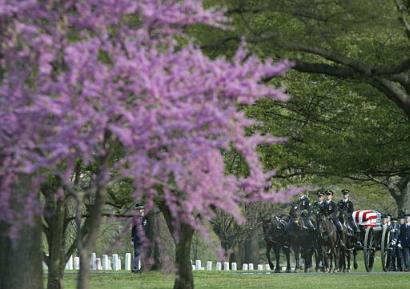
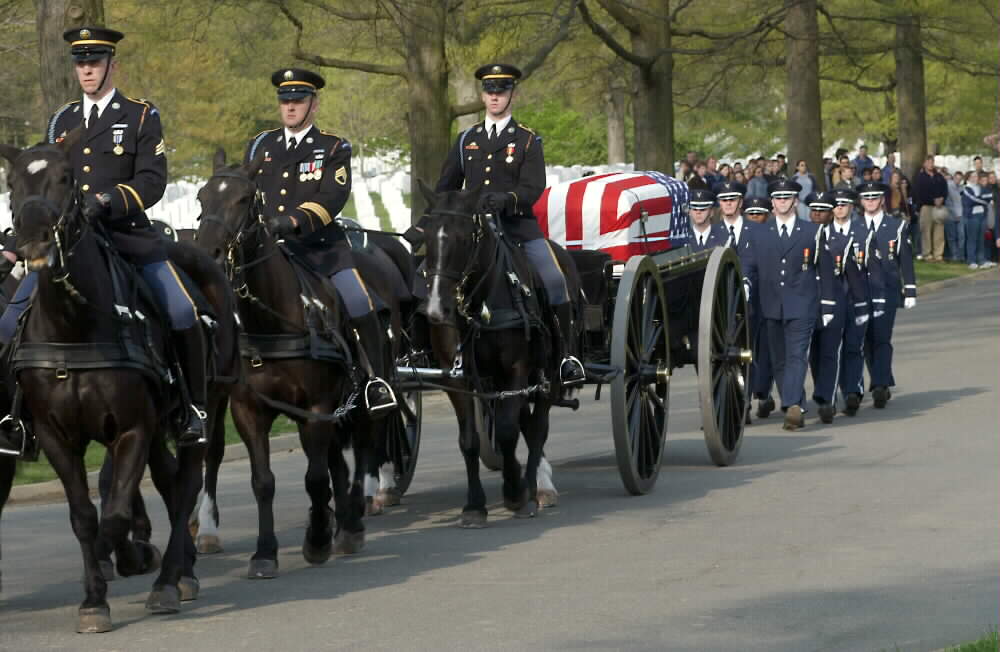
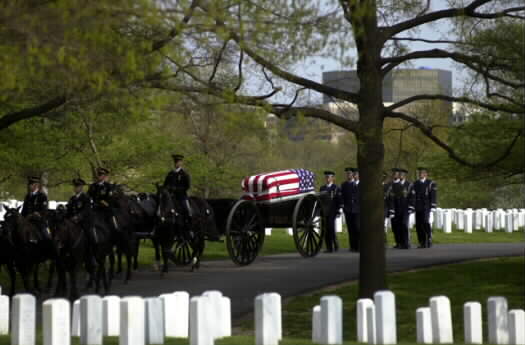
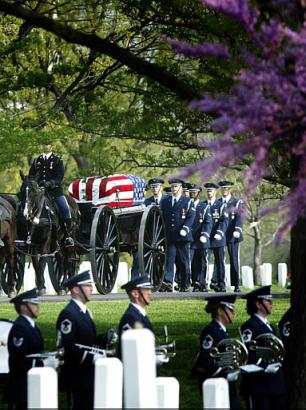
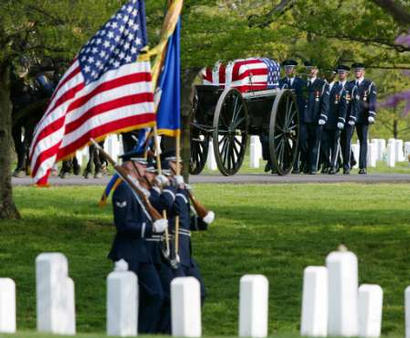
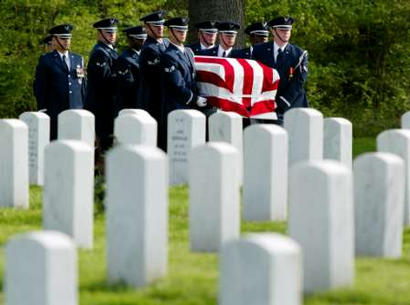
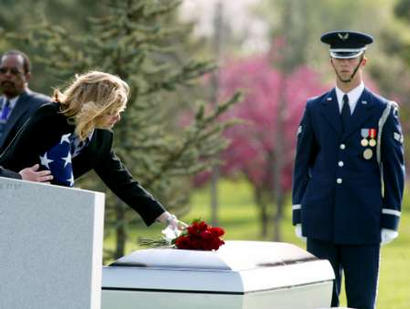
Press report of 4 April 2003:
Memorial for Stone set for Saturday
Friends at Mountain Home Air Force Base nicknamed Gregory Stone “Linus” because of his affection for the “Peanuts” cartoons. When they learned of his death, some of his former colleagues in the 34th Bomb Squadron Thunderbirds, deployed to the Persian Gulf, wrote a memorial tribute to Stone on a bomb. “As we always say in the 34th, ‘Once a T-bird, always a T-bird,’ ” Captain Jeff Haynes said. Stone, said Haynes, “was a great friend and outstanding aviator in the B-1 community.”
A memorial service for Major Gregory Stone of Boise will be held at 4 p.m. Saturday at the First United Methodist Church, Cathedral of the Rockies, 11th and Hays streets in Boise. A U.S. Air Force aircraft will do a flyover at the end of the service.
Stone, a member of the Idaho Air National Guard who was stationed in Mountain Home when he was in the Air Force, died March 25, 2003, from injuries in a grenade attack in Kuwait. He will be buried at Arlington National Cemetery in Virginia. A graveside service is set for 9 a.m. April 17, 2003.
From a press report of 29 March 2003:
Father’s letter arrives after deaths in Kuwait
BOISE, Idaho — Gregory Stone made sure his sons knew he loved them, and a letter to that effect arrived two days after his death in Kuwait.
Stone, 40, who was raised in Portland, was the first Idaho resident to die in the war with Iraq and one of the first confirmed American losses after grenades were tossed into command tents of the 101st Airborne in Kuwait last Sunday.
“It was good,” 11-year-old Alex said about his father’s letter, which arrived Thursday. “At the end he said he would be back and that we’d go to Universal Studios.”
The letters, along with other mementos saved by Alex and 7-year-old Joshua, are among the treasures that will help them remember their father, his ex-wife, Tonya Stone, said Friday.
Alex has started what he calls his “special drawer” inside the family’s Boise home to collect things that remind him of his dad.
Gregg and Tonya Stone had been married for 11 years when they divorced in 2000, she said.
Stone’s family members are now waiting for his body to be returned from Kuwait. He will be buried at Arlington National Cemetery in Virginia in mid-April. A memorial service is planned next Saturday at Boise’s First United Methodist Church.
Tonya Stone said the shock of his death Tuesday has been especially strong because of the circumstances that caused his injury. Another officer was killed and 14 others injured in the attack. Army Sergeant Asan Akbar is in custody following the attack.
Before Stone was deployed in early March, he talked with Alex and Joshua about his safety and assured them he would do everything possible to protect himself from harm. He showed his combat gear to his children, and Alex tried on his father’s bulletproof vest, the boys’ mother said.
“It’s really hard to realize what a loss they have, because they love him so much and I hate to have them lose that,” Tonya said.
Press Report: 26 March 2003
Second Officer Dies From Grenade Attack
Second Officer Dies From Grenade Attack
2 hours, 14 minutes ago
BOISE, Idaho – A second serviceman died Tuesday from wounds suffered in a grenade attack blamed on an Army sergeant, the military said.
Air Force Major Gregory Stone, 40, based in Boise, was pronounced dead at an Army field hospital in Kuwait, the Idaho Air National Guard said.
Sergeant Asan Akbar is in custody in the attack. He was shipped to a military jail in Germany on Tuesday after a judge found probable cause to try him for the crime. Akbar, an American Muslim who told family members he was wary of going to war in Iraq has not been charged.
Captain Christopher Scott Seifert, 27, of Easton, Pennsylvania, was killed and 14 other soldiers were injured in the attack.
Lieutenant Colonel Tim Marsano, spokesman for the Idaho Air National Guard, said Stone, a 20-year active and reserve veteran of the Air Force, was the Air Liaison Officer with the Army’s 101st Airborne Division at Camp Pennsylvania.
“My son died to allow the guy who killed him to believe what he believed,” his father, Richard Stone of Riggins, Idaho, told television station KIVI.
The father said his last contact with his son was through an e-mail Saturday. In it, Stone, said things were going well and he was a little nervous but ready for the mission.
Stone graduated from Benson High School in Portland, Oregon, and Oregon State University. He enlisted in 1983, went through the ROTC program at Oregon State and was commissioned in 1988.
“He was wonderful, the best son anybody could ask for,” said his stepmother, Sally Stone of Riggins, Idaho. Stone’s mother, Betty Lenzi of Ontario, Oregon, said she was too upset to talk.
Stone had two sons, ages 11 and 7, who live in Boise.
The Army said Akbar was taken to the Mannheim Confinement Facility from Camp Doha, Kuwait, where he will await a pretrial investigation, though it was not clear where that would take place.
Akbar was taken into custody shortly after explosions rocked several tents at the headquarters of the 101st Airborne Division’s 1st Brigade.
“It appears that the explosions were the result of three grenades that were thrown or rolled through the front door of each of these three tents,” according to a statement from Fort Campbell, Kentucky, home of the 101st.
Army investigators will complete a report and send it to Akbar’s superiors, said Marc Raimondi, a spokesman for the Army’s Criminal Investigation Division in Virginia. He wouldn’t speculate on when the investigation would be completed.
Before the latest death, military experts said Akbar could face one charge of intentional murder and additional charges of attempted murder for the wounded.
Eugene Fidell, a Washington lawyer and founder of the National Institute of Military Justice, said the crime could warrant the death penalty, which is rare in the military.
There are six people on the military’s death row, but there have been no military executions since 1961.
Akbar’s family members in Louisiana said they were stunned to learn that he had been accused of attacking his comrades.
During an interview Tuesday on ABC’s “Good Morning America,” Ismail Bilal said his brother “spoke just like any other soldier going overseas.” Akbar told him, “I would rather be at home. But I got to do my job,” Bilal said.
A soldier from the 101st Airborne Division has been charged with murder in a grenade attack on officers’ tents in Kuwait that killed two.
The charges against Sergeant Hasan K. Akbar, 32, were announced Friday afternoon. Fort Campbell officials said Akbar was charged March 25 with two counts of premeditated murder and 17 counts of attempted murder, under military law.
If convicted, Akbar could face the death penalty, according to Dennis Olgin, a retired judge advocate general’s corps officer.
Akbar was also charged with one count each of aggravated arson of an inhabited dwelling and misbehavior as a sentinel while receiving special pay.
Akbar was returned to the United States last Friday and was being held at an undisclosed military facility.
Akbar is the only person charged in the grenade attack that killed two U.S. officers and wounded 14 other soldiers on March 23, 2003. He was transferred from Kuwait to the military detention center in Mannheim, Germany, after the attack, then to the United States.
Officials are still investigating the attack, which killed Army Captain Christopher Scott Seifert, 27, of Easton, Pennsylvania, and Air Force Major Gregory Stone, 40, of Boise, Idaho.
The attack happened in the early morning hours in the command center of the 101st Division’s 1st Brigade at Camp Pennsylvania. Days later, the 1st Brigade began moving into Iraq.
Fort Campbell said military defense counsel had been assigned to Akbar and that he could hire a civilian lawyer on his own. Military lawyers representing Akbar had no comment, the post said in a statement.
Akbar, a black Muslim, has been described as resentful about alleged religious and racial discrimination in the Army.
STONE, GREGORY L
- MAJ US AIR FORCE
- VETERAN SERVICE DATES: 09/05/1985 – 03/25/2003
- DATE OF BIRTH: 02/06/1963
- DATE OF DEATH: 03/25/2003
- DATE OF INTERMENT: 04/17/2003
- BURIED AT: SECTION 60 SITE 7864
- ARLINGTON NATIONAL CEMETERY
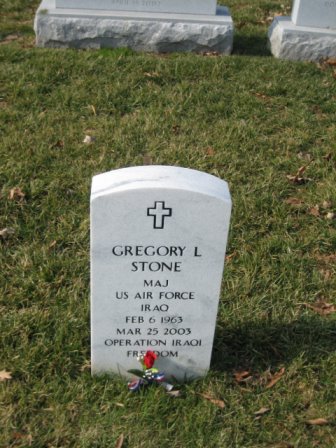
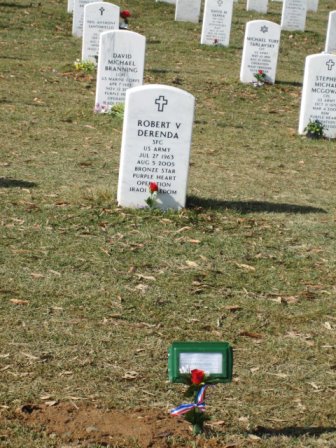
Michael Robert Patterson was born in Arlington and is the son of a former officer of the US Army. So it was no wonder that sooner or later his interests drew him to American history and especially to American military history. Many of his articles can be found on renowned portals like the New York Times, Washingtonpost or Wikipedia.
Reviewed by: Michael Howard

